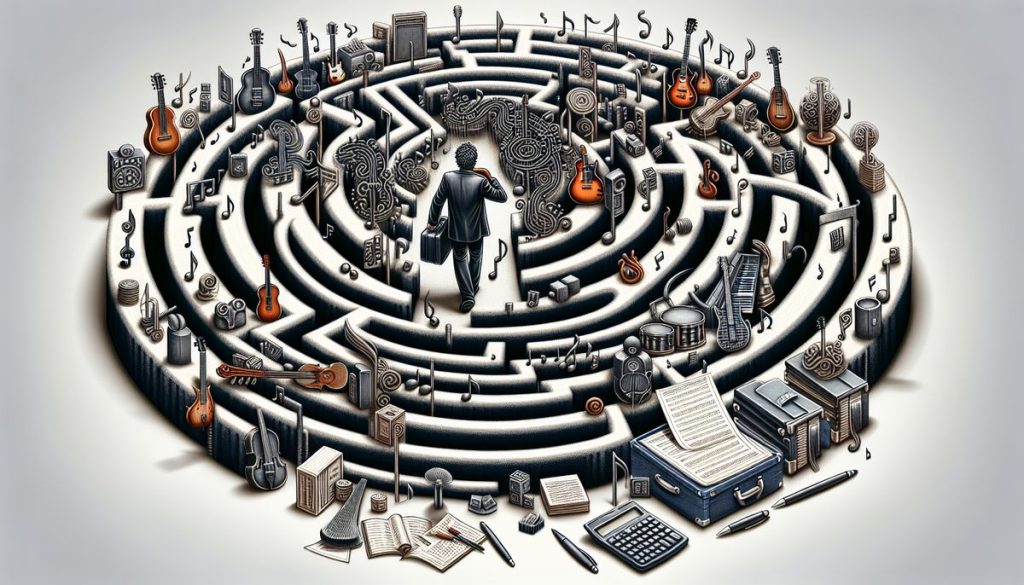Navigating the Music Industry: Essential Copyright and Trademark Law Tips for Upcoming Artists
Written by DJ Prodigee on Tue Mar, 2024
For aspiring musicians, the path to stardom is not only about perfecting your craft but also about understanding the legal framework that protects your work. The music industry is laden with copyright and trademark intricacies that can make or break an artist’s career. This article delves into the essential copyright and trademark law tips for upcoming artists, offering guidance to help you navigate the legalities and ensure your artistic creations and brand remain safeguarded.
Key Takeaways
- Comprehend the basics of copyright law to avoid infringement and protect your original work.
- Understand the importance of registering your music to claim your rights and control how your creations are used.
- Learn the nuances of trademark law to protect your band’s name, logo, and merchandise, ensuring your brand’s integrity.
- Be vigilant about the contracts you sign; know what you’re agreeing to and how it affects your rights and royalties.
- Stay informed about how to collect royalties, both domestically and internationally, to ensure you’re fairly compensated.
Copy-WHAT? Decoding Copyright Mysteries for Tune Crafters
What Even Is Copyright and Why Should I Care?
Alright, tune crafters, let’s dive into the deep end of the legal pool \(no lifeguard on duty\). Copyright is like your music’s guardian angel, watching over your tunes so that no sneaky copycat can swipe your sick beats without facing the music \(legally speaking\). But why should you care? Well, imagine you’ve just dropped the hottest track of the century, only to find it’s being blasted everywhere, and you’re not seeing a dime. Not cool, right?
Copyright and trademark laws protect original works in the music industry. Understanding contracts, internet distribution, and the broader legal landscape is crucial for musicians. Here’s a quick breakdown of what you need to keep your eyes \(and ears\) on:
- KNOW WHAT CONSTITUTES A COPYRIGHT VIOLATION: It’s not just about not stealing others’ work; it’s also about not letting others steal yours.
- USE ONLY YOUR ORIGINAL WORK: This is your creative fingerprint. Don’t let someone else claim it!
While copyright protection is automatically granted to the author as soon as the work is created, there are extra perks if you register. Think of it as VIP access to the copyright club.
Remember, copyright disputes are like that one song that gets stuck in your head: annoying, time-consuming, and expensive. So, keep your creations close and your copyrights closer!
The Mixtape of Law: Sampling, Covers, and Copyright No-Nos
Alright, tune crafters, let’s dive into the mixtape of law where the beats are tight, but the legal grip is tighter. Sampling a track without permission is like taking someone else’s guitar and rocking a solo at your gig
-
it’s not just frowned upon, it’s illegal. And while covering a song might seem like flattery, it can quickly turn into a lawsuit if you don’t clear the rights first. Here’s a quick breakdown of what you need to know:
-
Sampling: You need a master use license and a sync license. Yup, two of them. Like peanut butter and jelly, they’re a package deal.
-
Covers: Paying for a mechanical license lets you record and distribute your version legally. No mechanical license, no cover. Simple as that.
Remember, folks, creativity is about making your own waves, not just riding on someone else’s. So, before you sample that sick beat or belt out a cover, make sure you’re not stepping on any legal toes.
Registering Your Jams: A Step-by-Step Guide to Claiming Your Rights
Alright, tune crafters, it’s time to get serious about your jam. You wouldn’t want someone else taking credit for your sick beats, would you? Registering your copyright is like calling dibs on your music
- Step 1: Write down your masterpiece. If it’s not written, it doesn’t exist in the eyes of the law.
- Step 2: Record your track. A tangible form of your music is key.
- Step 3: Fill out the copyright form. Be honest, it’s less complicated than writing your lyrics.
- Step 4: Pay the fee. Think of it as an investment in your future platinum records.
- Step 5: Send it all in! And then, the waiting game begins.
Remember, the early bird gets the copyright worm. The sooner you register, the sooner you’re legally locked and loaded.
So, there you have it. A no-nonsense, five-step dance to make sure your tunes are legally yours. Now, go forth and protect those bops!
Trademark Tango: Branding Your Band Without Stepping on Legal Toes
Your Band’s Name in Lights: Protecting Your Brand
So, you’ve got a band name that’s cooler than a polar bear’s toenails, and you’re ready to light up marquees from here to Timbuktu. But hold your horses, rockstar! Before you print a single T-shirt or slap that name on a bass drum, you need to talk about trademarks. Trademarks protect a brand while copyrights guard your sick guitar solos and heart-wrenching ballads.
Here’s the skinny: trademarking your band name isn’t just about legal mumbo jumbo; it’s about claiming your space in the music jungle. With millions of bands out there, you don’t want some garage band from Nowheresville riding your coattails to fame. Trademark your band name, and you’re telling the world, "This coolness is ours, hands off!"
Remember, seeing ‘ in a company name means the business is staking its claim, and you should too!
Now, let’s break it down with a list that even drummers can follow:
- Dream up a unique band name (no "The Plagiarists," please).
- Search the trademark database to make sure it’s not taken.
- File your trademark application (don’t forget the fees!).
- Wait for the approval and fend off any copycats.
- Celebrate with an over-the-top band photoshoot.
Merch Madness: Trademark Tips for Your Swag
So you’ve got fans clamoring for t-shirts with your face plastered on the front and keychains shaped like your guitar. Merch can be a goldmine, but before you start printing your face on every conceivable surface, let’s talk trademarks. Trademarks are like the bouncers of the branding world, keeping your band’s identity safe from those pesky bootleggers.
Trademark clearance is not just a fancy term your lawyer throws around to sound smart. It’s essential, like that one roadie who actually knows how to fix the soundboard. You gotta make sure no one else is already using your oh-so-clever band name or logo. Here’s a quick checklist to keep you out of the legal mosh pit:
- Conduct a thorough search of federal and state registers.
- Don’t forget to check the common law arena (that’s lawyer-speak for ‘stuff that’s not registered but still protected’).
- Consult with legal counsel because, let’s face it, you’re a musician, not a trademark guru.
Remember, trademarking your merch is like putting a padlock on your diary. It keeps your secrets safe and your brand even safer.
And if you think this is just about t-shirts and posters, think again. Trademarks cover everything from your band’s name to those catchy phrases from your lyrics that fans love to quote. So, protect your brand like you protect your guitar: with fierce love and a touch of paranoia.
Avoiding the ‘That’s My Logo!’ Drama: A Trademark Checklist
So you’ve got a killer band name and a logo that screams ‘rockstar’ – but before you slap that bad boy on every t-shirt and sticker, let’s make sure you’re not stepping on any legal landmines, shall we? Avoiding problems down the road starts with a little thing called trademark clearance. It’s like a crystal ball that tells you if your brand’s future is bright or if you’re about to crash into someone else’s trademark party.
Here’s a quick checklist to keep your band’s branding drama-free:
- Check for uniqueness: Make sure your band’s name and logo aren’t already taken by some other group of hopeful headbangers.
- Trademark it: Once you’re in the clear, legally claim your name and logo as your own. It’s like putting a ‘keep out’ sign on your treehouse.
- Enforce your rights: If someone tries to copy your style, don’t just throw a guitar at them – take legal action!
Remember, quality control is key. You want your fans to associate your swag with the same awesomeness as your music. And don’t forget about the nitty-gritty details like duration, termination, and the ever-so-fun approval process. Because nothing says ‘rock ‘n’ roll’ like a well-drafted legal agreement, right?
Making informed decisions about your brand is crucial in a world where everyone wants to be a star. A comprehensive trademark clearance search is your backstage pass to a hassle-free branding experience.
Contract Conundrums: Navigating Agreements Without Losing Your Soul (or Rights)
The Fine Print: What to Look for Before You Sign
Before you ink that deal and pop the champagne, let’s talk about the fine print. It’s like the last level of a video game, except the boss is a bunch of legalese that could zap your rights away. Read every line like it’s the secret to your next hit single.
- Rights and Royalties: Who gets what, when, and how much? Make sure your future self will thank you for the royalties you’ve secured.
- Term and Termination: Know the escape plan. How long are you locked in, and what’s the breakup fee?
- Obligations and Expectations: What are you promising, and what’s being promised to you? Don’t agree to tour Mars unless Elon’s providing the spaceship.
Remember, a contract is like a tattoo, it’s pretty permanent. So unless you want your lawyer’s name next to your mom’s heart tattoo, get the terms right.
And hey, if the contract’s got more red flags than a bullfighter’s closet, don’t be afraid to say ‘no deal’. Your future hits—and sanity—will thank you.
Collaboration or Con? Partnering Up with Producers and Labels
So, you’re ready to take your tunes to the next level and you’re thinking, "Hey, maybe I should team up with a producer or a label." Great idea! But before you jump into bed with the first smooth-talker who promises you the moon, let’s talk turkey. Collaboration is the secret sauce that can take your music career to the next level, but it’s also a minefield of potential cons.
Here’s the skinny: partnering up can be a game-changer, but you gotta know who you’re dealing with. We’re talking about a relationship here, not a one-night stand. So, put on your detective hat and do some sleuthing. Check out their past work, ask around, and maybe even stalk their social media (for research purposes, obviously).
Remember, a contract is not just a piece of paper; it’s a roadmap for your future partnership. So read it like your career depends on it—because it does.
Now, let’s break it down with a list of things to keep your peepers peeled for when considering a partnership:
- Reputation: Are they known for making hits or making headaches?
- Experience: Have they turned newbies into stars or just into has-beens?
- Resources: Do they have the tools to make your dreams a reality, or just a really convincing PowerPoint presentation?
- Transparency: Will they show you the books, or do they get shifty when you mention money?
And remember, if the deal sounds too good to be true, it probably is. Don’t let the glitter of potential fame blind you to the nitty-gritty of business. Stay sharp, stay savvy, and keep your eyes on the prize!
Getting Out of a Bad Deal: Tips for a Clean Break
Ever felt like you’re in a relationship with your contract that’s gone sour? Well, unlike your ex, you can’t just ghost a bad deal. Getting out of a sticky contract situation requires some finesse and a bit of know-how. Here’s the lowdown on ditching the deal without causing a scene:
- Firstly, understand your contract inside out. Look for the escape hatch clauses like ‘termination’ and ‘breach of contract’.
- Secondly, keep an eye out for any breaches by the other party. A common deal-breaker? Failure to make timely payments.
- Thirdly, document everything. Your future self will thank you when you’re sifting through evidence instead of vague memories.
Remember, it’s not about burning bridges; it’s about building a better path for your future tunes.
And if you’re feeling overwhelmed, consider this: sometimes, the cost of staying in a bad deal is higher than the cost of getting out. So, grab your metaphorical scissors and cut the cord if you must—just make sure you’re not running with them.
Royalty Riddles: Making Sure You Get Paid Without Getting Played
Show Me the Money: Understanding Royalties 101
Alright, tune crafters, let’s dive into the wallet-filling world of royalties. Imagine every time your jam plays on the radio, streams on the internet, or even gets blasted at a wedding, you get a slice of the pie. That’s the sweet, sweet sound of royalties ringing in your ears.
Monetizing music involves understanding royalties, rights, and licensing. Mechanical and performance royalties, sync fees, and merch sales contribute to artists’ earnings in a complex industry. But how do you keep track of all these coins dropping into your piggy bank? Here’s a quick breakdown:
- Mechanical Royalties: Cash from CDs, vinyl, and digital downloads.
- Performance Royalties: Moolah when your music is performed publicly.
- Sync Fees: Bucks for when your tunes are synced with visual media.
- Merch Sales: Dough from selling branded goodies.
Remember, it’s not just about making music; it’s about making money from your music. And that means getting your head around the different types of royalties and how they work.
Music Rights Organizations: Who Are They and What Do They Do?
Ever feel like you’re in a maze, blindfolded, trying to find the cheese that is your music royalties? Well, that’s where Music Rights Organizations (MROs) come in, acting as your trusty guide dogs. These organizations are like the superheroes of the music world, swooping in to make sure that when your tunes are played, you get paid. They collect royalties on behalf of songwriters, composers, and publishers and distribute them accordingly. It’s like having a financial guardian angel for your music.
But wait, there’s more! Not all MROs are created equal. In the US, you’ve got the big players: BMI, ASCAP, and the more exclusive SESAC. Choosing the right one can feel like picking a favorite ice cream flavor—overwhelming but deliciously important. Here’s a quick breakdown:
- BMI (Broadcast Music, Inc.): The all-you-can-eat buffet of PROs.
- ASCAP (American Society of Composers, Authors, and Publishers): The classic choice with a twist.
- SESAC (originally the Society of European Stage Authors & Composers): The fancy, invite-only dinner party.
Remember, picking the right PRO is like choosing a partner for the music prom. You want someone who gets you, supports you, and most importantly, makes sure you get that royalty corsage.
International Intrigue: Collecting Royalties Across Borders
So you’ve got fans in France and listeners in Lithuania – congrats, you’re an international sensation! But before you start shopping for your world tour jet, let’s talk about those pesky international royalties. These are the payments you get when your tunes are played outside of your home turf. And yes, they’re as complicated as trying to order a latte in a foreign language without accidentally buying a llama.
Navigating the legal landscape of each country is like doing the hokey pokey with paperwork. Different countries have different copyright laws and licensing requirements, and if you’re not careful, you could end up with a lot less in your pocket than you deserve. Here’s a pro tip: get yourself a savvy local who knows the ins and outs of their country’s music money maze.
Remember, collecting international royalties is not just about cashing in; it’s about making sure your creative work is respected and compensated globally.
Now, let’s break it down with a list of things to keep in mind when you’re trying to get your international royalty game on point:
- Understand the copyright laws in each country.
- Partner with local entities or representatives.
- Keep track of your music’s usage and performance.
- Be aware of the taxation implications.
- And lastly, don’t forget to celebrate every little victory, because hey, your music is playing around the world!
Wrapping It Up With a Beat
Alright, rockstars and pop divas of the legal document charts, we’ve jammed through the nitty-gritty of copyright and trademark law like a killer solo. Remember, your music isn’t just an art form; it’s a potential legal battleground, so arm yourself with knowledge and a good lawyer. Keep your tunes original, your brand on point, and your contracts tighter than your skinny jeans. And if you ever feel lost in the legal maze, just think of this article as your trusty GPS, guiding you to stardom without the drama of a courtroom encore. Now go out there and make some noise (legally, of course)!
Frequently Asked Questions
What is copyright and why is it important for musicians?
Copyright is a legal right that grants the creator of original work exclusive rights to its use and distribution, usually for a limited time, with the aim of enabling the creator to receive compensation for their intellectual investment. For musicians, it’s crucial as it protects their songs, recordings, and compositions from being used without permission, ensuring they can monetize their creations.
How does trademark law apply to musicians?
Trademark law protects brand names, logos, and slogans used to identify and distinguish products or services. For musicians, it can apply to band names, album titles, and merchandise, helping to prevent others from using similar marks that could cause confusion and diluting the brand’s value.
What should I be aware of before signing a music contract?
Before signing a music contract, understand the terms of rights assignment, compensation, obligations, duration, and exit clauses. Seek legal advice to ensure the contract is fair and doesn’t exploit your rights or labor. Pay attention to royalty rates, copyright ownership, and the specifics of distribution and promotion.
Can I use someone else’s music for my cover or sample legally?
To legally use someone else’s music for a cover or sample, you typically need to obtain a license from the copyright owner. For covers, a mechanical license is required, while sampling often requires negotiation for a direct license, as there’s no compulsory licensing structure for samples.
What are music royalties and how do I collect them?
Music royalties are payments that rights holders receive for the use of their music by others. They can be collected through performance rights organizations (PROs) for public performances, mechanical royalties for reproductions of songs, synchronization royalties for music used in media, and others. Register with PROs and ensure your works are properly credited to collect royalties.
How can I protect my music from copyright infringement internationally?
To protect your music from copyright infringement internationally, ensure your copyright is registered in your home country and consider registrations in territories where your music is popular. Utilize international agreements like the Berne Convention. Work with legal professionals to understand specific regional laws and enforcement mechanisms.







